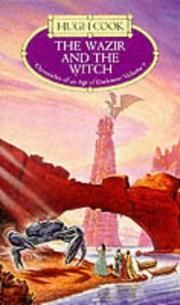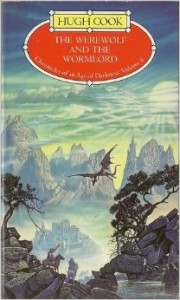Cook's Books part 2
 Very tempted to call this one "Too Many Cooks" but that would be entirely unjust.
Very tempted to call this one "Too Many Cooks" but that would be entirely unjust.
This follows my earlier post going over the first half of Hugh Cook's Chronicles of an Age of Darkness series which, for ease of reference, can be found here.
We've seen so far a fantasy series with buried Old-tech elements, and we've seen Cook experimenting with style and roundly burlesquing various traditional elements of the fantasy genre. I get the impression that sales were probably falling off throughout the series (possibly with a spike for Walris and Warwolf which seems to be one of the best regarded, and justly so). In the second half of the series, Cook basically tears up the manual as far as "how to write a fantasy book in the 80s and 90s and starts doing wild and crazy stuff, and eventually sets out What Is Going On in his world to bring things to a satisfactory conclusion.
One thought I've had since the last article regards Cook's style and humour. Whilst it is very unusual for fantasy of the time, it can be seen as a strong homage to Vance's Dying Earth, to which it often has a similar feel (this can only ever be a compliment).
I do want to say a word about covers, because Cook suffers from a serious infestation of Dragons. It is true that there are dragons in the series. There are traditional dragons, that play a major role in book 1. There are intelligent sea-dragons in book 2. There are tiny pet dragons in other books. From the covers, though, you'd think the books were basically 24-hour rolling dragons. The worst of this is the cover for Walrus which shows a rather malformed dragon fighting a ship. This is actually a scene from the book, except the creature involved is not in any way a drag0n.
The Wishstone and the Wonderworkers takes us to another part of the world from the previous books (we will meet familiar characters, but I don't think the action returns to its old stomping grounds). It also breaks with normal narrative format by being the heavily annotated (and redacted) account of a very unreliable narrator. The plot mostly concerns various parties (including some familiar faces from earlier books) trying to get hold of the titular wishstone set against wider political squabbles on the island of Untuchilamon. In this book we are first introduced to the idea that Cook's world is a cut-off appendix from a greater galactic community (the Nexus) as a number of characters are left-over remnants of those days (there are artificial intelligences whimsical and murderous, and there is a hyperintelligent reality warping entity that inhabits the form of a gigantic crab. Of course, nobody believes any of it. Cook also deals with ethnic diversity, oppression and prejudice, in a manner bleak and uncompromising, as he will do again.
The Wazir and the Witch follows on, in content and format, from the above, and concerns the collapse of order on Untuchilamon following a régime change in the wider empire it is part of. New governors are on the way and the to-be-ousted ruler, Justina Thrugg, is faced with trying to save herself and her people from a messy demise when they do. This is Cook's second book with a female protagonist (insofar as anyone is a protagonist) and again he shows he can do it extremely well. This book and its predecessor form a complete story between themselves, and arguably the linking over-plot is the story of the Hermit Crab (the crab features on the cover of my version, but the artist insistently places a dragon rampant on a pinnacle in the background. To my recollection there are no dragons larger than your hand in the book).
The Werewolf and the Wormlord is another burlesque/deflation of heroic fantasy. Set in another state of the overarching empire, and involving Justina Thrugg as a supporting character, it gives us Alfric, a banker, who is called on to take on the heroic mantle of his family, lead the ancient order of the Yudonic knights, fight monsters and find out which of his family has inherited the dread curse of the werewolf. Except nothing goes right for Alfric. At first he just wants to be a banker (and this is a bank that controls a network of Old-tech portals that link places across world, which will become very relevant later). Then he throws himself into becoming a knight, except the monsters are reluctant to be slain, the knights themselves are big on talk but, when it comes to action, are basically more like a gentleman's club, and the werewolves… well, I'll put the secret in a footnote, but the werewolf curse is a masterpiece of fantasy comedy (1).
The Worshippers and the Way is the mind-blowing one. It takes place on yet another part of the world, where a strife-ridden city is ruled by an élite who come out of the Combat College, where they are trained in all the martial techniques they might require… to fly starfighters and command capital ships in an intergalactic empire. Training is done by holo-suite, and the skills thereby imparted are, obviously, utterly useless in the wider world. The College is run by an AI whose primary objective is to Keep Things Running, but it is a genuine AI and therefore makes various accommodations and compromises with the locals. The book is mostly about ethnic and religious unrest — including an ancient heretical religion preserved in records of the intergalactic society that becomes a flag for a popular uprising. This book is not funny in the way Cook is usually funny. It is grim and bitter and bleak and fascinating. The pathos of the Combat College, the nastiness of the class and racial divides and the unpleasant measures the lead character is forced to take are all presented shorn of sentiment. One of the key lines comes at the end and concerns treatment of women. The Combat College has been egalitarian, but the new society (which has kicked out an exploitative apartheid-style system) is very much not (there are precious few real heroes in Cook). The revolutionaries who want everything from their new world aren't going to get it because the land is poor and there isn't enough to go round. "What, then, could be offered to the men who had so suddenly been made equal members of a just society? Why, the rule of (i.e. over) women, of course!" Cook at his most cynical.
Finally we have The Witchlord and the Weaponmaster which is the story of Guest Gulkan, the titular Weaponmaster. Guest has walked through most of the previous books in the series, and has been manifestly a hero looking for a book to star in. He has tended to turn up, be introduced as the famous questing Weaponmaster hero, and then slink off to obscurity. This is his story. Is Cook about to give us a traditional heroic narrative? Of course not. Guest, like several of Cook's past protagonists, is a young man with an opinion of himself that far exceeds his actual abilities (he is a better realised Watashai from Wicked and Witless). As for his epithet, he chooses it as a reward, leading to the memorable exchange:
"'My lord,' said Guest. 'I have long wished to be known as the Weaponmaster… but you have ever denied me such a title.'
'I have denied it for a very good reason,' said Lord Onosh. 'The very good reason being that you are the master of no weapon.'
 Guest has a sprawling series of adventures, through portals, across the world, meeting various people from other books — in some ways the most Cook-ish of all of Cook's narratives. He and his father are alternatively staunch allies and at daggers drawn, and more Old-tech is uncovered. And at the end of it all, somehow and despite all odds, Guest grows up. He puts aside childish things, has his final clash with his father and, more by luck than judgment, finds himself in the perfect position to change the world. The book ends looking towards a future where the portal system of the banks and the advanced tech and medicine of the Combat College form the basis for a new human civilization that will again be able to reach for the stars. By which time we are well aware that Guest Gulkan, maturity aside, is by no means a good hero or a good man, even though he may in the end be a Good Thing, which is Cook's final lesson on how history often plays out.
Guest has a sprawling series of adventures, through portals, across the world, meeting various people from other books — in some ways the most Cook-ish of all of Cook's narratives. He and his father are alternatively staunch allies and at daggers drawn, and more Old-tech is uncovered. And at the end of it all, somehow and despite all odds, Guest grows up. He puts aside childish things, has his final clash with his father and, more by luck than judgment, finds himself in the perfect position to change the world. The book ends looking towards a future where the portal system of the banks and the advanced tech and medicine of the Combat College form the basis for a new human civilization that will again be able to reach for the stars. By which time we are well aware that Guest Gulkan, maturity aside, is by no means a good hero or a good man, even though he may in the end be a Good Thing, which is Cook's final lesson on how history often plays out.
(1) SPOILERS The plot is very concerned with who is The Werewolf. Everyone knows there's a werewolf about and it is a terrible stigma attached to Alfric's family. The problem is, Alfric knows that he is the werewolf, something he keeps very much under wraps. Except he soon realises that various other members of his family are also werewolves, and eventually it comes out that everyone's a werewolf, assiduously hiding it from each other.
 © 2008-2025 Pan Macmillan
© 2008-2025 Pan Macmillan